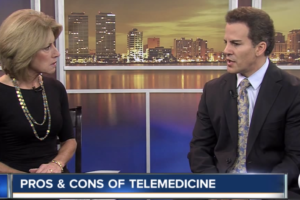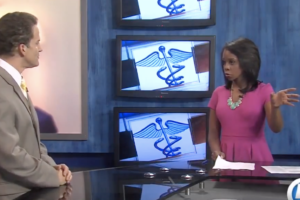Speaker 1: Now is the time to answer some of your common health questions. As always, NewsChannel 5’s medical expert, Dr. David Soria, the Chief of Emergency Medicine at Wellington Regional Medical Center is here.
Dr. David Soria: Well, hello.
Speaker 1: Let’s start with this one right here. A viewer questioned, “Are women more likely to develop gallstones than men?”
Dr. David Soria: Yeah. You know what? They really are, actually significantly more. 25% of all women will development gallstones by age 60, and 50% by 75.
Speaker 1: Wow.
Dr. David Soria: As opposed to only 25% of men. We really think it’s because of estrogen. Estrogen is known to increase the cholesterol, or at least the conversion of cholesterol in the liver to bile, which then, of course, can accumulate and create gallstones. There’s two additional reasons that are specific to women. Number one, pregnancy. We see gallstones commonly in pregnancy. The estrogen build up …
Speaker 1: Sure.
Dr. David Soria: … the bile formation, and so forth. Also, hormone replacement therapy in elderly women for osteoporosis and the like, also with the estrogen, the exogenous estrogen that they’re being given, can also increase triglycerides, which can then in turn form more bile. If you’re a women, middle aged or greater, and you’re developing pain here underneath the rib, probably not indigestion. Make sure you get it checked out, because most likely, not even somewhat, most likely …
Speaker 1: But most likely.
Dr. David Soria: … it’s going to be gallstones.
Speaker 1: Wow. Okay.
Dr. David Soria: Get it checked out.
Speaker 1: Two words right now, high blood pressure. So many people out there are familiar with that.
Dr. David Soria: Yeah.
Speaker 1: Can you go over the symptoms for us?
Dr. David Soria: Sure. That’s actually one of the biggest misperceptions of that, is that if you’re not having symptoms, “I must be fine, I must not have high blood pressure.” The reality is that hypertension, or high blood pressure, is a symptomless disease. You will not have symptoms unless it’s real high. Typically, upwards of high normal is a systolic of 140.
You’re not going to develop symptoms until your systolic is 180 or greater, and those symptoms at that point when your blood pressure is dangerously high will be headache, chest pain, shortness of breath, dizziness, things like that. But when you are within normal, high, you will absolutely for the most part not have any symptoms. What can happen, untreated for longer term, develop heart disease, kidney failure, stroke, things that can long term affect the heart.
Speaker 1: Have it checked regularly?
Dr. David Soria: Always, always, always go to your doctor, make sure you get checked …
Speaker 1: So it doesn’t creep up on you.
Dr. David Soria: … regular and if you can’t, just go to your local drug store or local supermarket …
Speaker 1: They do it, just stick out that arm.
Dr. David Soria: … and get it checked out.
Speaker 1: We love it.
Dr. David Soria: Very important. It could safe your life.
Speaker 1: All right. Thanks Dr. Soria.
Dr. David Soria: You’re welcome.
Speaker 1: If you have a question for the doctor, you can send it in by going to our website, wptv.com. Click on Health Link, you’ll scroll down on the right-hand side, you’ll see that form to fill out your question.




